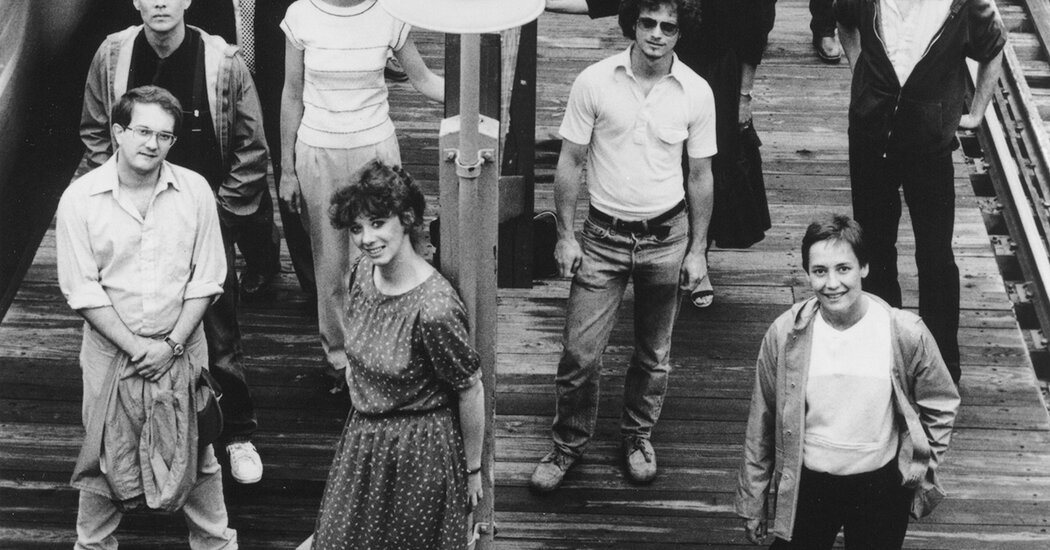In 1978, the actress Amy Morton ushered for a production of Lanford Wilson’s play “Fifth of July” that a scrappy theater company called the Steppenwolf — founded by Gary Sinise and Jeff Perry, friends from high school, and their friend Terry Kinney — took to the St. Nicholas Theater in Chicago.
“There was something about the way these people behaved onstage that wasn’t like anything I’d seen,” Morton, a Steppenwolf ensemble member since 1997, said in a phone interview. “They weren’t serving the play on a silver platter. They were giving us a whiff and constantly moving the food farther away so you have to keep leaning in. It was riveting.”
Fast forward to 2025, and Steppenwolf is embarking on its 50 anniversary season as one of America’s pre-eminent theater companies. An invitation to join its storied ensemble — a familial coterie of actors, directors and writers — is a golden ticket.
“Actors and artists can feel like they’re constantly auditioning for the next jobs,” said Audrey Francis, who, with Glenn Davis, serves as Steppenwolf’s artistic directors. “What makes the ensemble ethos special is that we say we want to work with you for the rest of your artistic life.”
What sets Steppenwolf’s ensemble model apart is its very American emphasis on aggressively naturalistic acting, often in new work. A sense of humor too: In an email message, Laurie Metcalf, who joined the company in 1975, said she often found herself eager to make her fellow actors “laugh at the audacity of an acting choice or give a nod to an unexpected line reading.”
Steppenwolf’s longtime home has been on Chicago’s North Side. But its second home is New York, starting with a 1982 production of Sam Shepard’s “True West.” Several of its productions, including the prodigious “The Grapes of Wrath” in 1988 and “August: Osage County” in 2007, have transferred to Broadway. The company has earned 14 Tony Awards, among them the prestigious regional theater Tony in 1985.
This year, three Steppenwolf-born plays claimed turf on Broadway. In June, Branden Jacobs-Jenkins’s “Purpose” won the best play Tony Award. Samuel D. Hunter’s “Little Bear Ridge Road,” starring Metcalf and Micah Stock, is in previews. On Dec. 16, performances begin for a revival of “Bug,” written by Tracy Letts and starring Carrie Coon, his wife, and Namir Smallwood.
This fall, ensemble members were asked to reminisce about a Steppenwolf moment they can’t shake or that changed their lives. Their answers have been edited and condensed.
Jeff Perry, Steppenwolf co-founder
Around 1973, I met some abnormal people in the Illinois State University theater department campus in [the town] Normal. Two of them were John Malkovich and Moira Harris. I watched them in [Harold] Pinter’s one-act “The Lover” in the smallest theater on campus. I thought wow, they’re operating on pure intuition, adrenaline, instinct.
Because this play is about the unknowable, the actors were unpredictable. It was the difference between creation and presentation, between jazz and the preordained. Watching them, I caught an origin glimpse of what would become Steppenwolf’s DNA.
Joan Allen, member since 1978
In the late ’70s, I’d been newly invited into the company, and was ushering for “The Glass Menagerie” in the [company’s] original Highland Park 88-seat theater. Laurie Metcalf, Terry Kinney and John Malkovich were in the show. I stood in the back and watched nearly every performance. Their work was so organic, nuanced and fresh. I was entranced.
Gary Sinise, Steppenwolf co-founder
Oct. 17, 1982, was opening night of “True West” at the Cherry Lane Theater. The party was at a restaurant-bar called Chumley’s near the theater. Anticipation built, and finally it was late enough that the following day’s New York Times was out. One of the producers jumped on a table, got everyone’s attention and read the review. It was a rave, and life began to change.
Terry Kinney, Steppenwolf co-founder
Laurie Metcalf’s 20-minute monologue in [Lanford Wilson’s] “Balm in Gilead,” the one we brought to Circle Rep [in New York] in 1984, was absolutely alive and detailed. Her character is a Midwestern girl who’s in New York, and she’s completely naïve. She’s also a prostitute. Her monologue is her looking back on how she came to New York, mundane stuff but electric to listen to, the kind of thing you can overhear in a diner — it’s set at a diner — and it breaks your heart, the crushing sadness that this person is surviving and denying.
Lois Smith, member since 1993
“The Grapes of Wrath” is on my mind. The significant moment was the day I flew to Chicago because they had heard my name. I sat on the lip of the stage, and Frank Galati, who had adapted it and directed it, asked me to read all of Ma Joad’s part. I did, with enormous pleasure. Then I went next door to get something to eat, and while I was there Randy Arney, the assistant director, rushed over and said “We want you to do it.” It became a touchstone in my life.
K. Todd Freeman, member since 1993
“The Song of Jacob Zulu” was my Broadway debut in 1993. The night before [The New York Times’s] Frank Rich came to review the show, I was overzealous in one of the stage fights where I got slapped onto a table. I did something to my neck, and I woke up and couldn’t turn my head. I called the stage manager to say I couldn’t do the show, and they said Frank Rich is coming. My stage manager found a wonderful masseur-acupuncturist who got my head to move. I went on, still in pain, but it was great.
Tina Landau, member since 1997
After we opened my first production at Steppenwolf in 1997 — Chuck Mee’s “Time to Burn” — [the former artistic director] Martha Lavey invited me to direct again the next season. I told her I had a piece I’d been dreaming of called “Space.” I was the writer, and I was obsessed with the subject matter and could visualize the production. But there was no script. I described to her everything I could about this imaginary production. With just that knowledge Martha said, “OK, that’s obviously what we should do.” “Space” was programmed for 10 months later. What Martha offered me was less a slot in a season than an artistic home.
Tarell Alvin McCraney, member since 2010
As a student at DePaul, I saw “Glengarry Glen Ross” around 2001. I remember thinking to myself: I’m watching something incredible happen. I felt like I was watching people create a world that exists in this moment. It was a dress rehearsal. It wasn’t six weeks into the run. They were just doing it to make sure the lights were in the right place. But they were sweating, they were rapid fire, they were thinking through. They were doing it in front of this audience to the fullest extent because they needed to. I felt I saw what freedom onstage could look like.
Jon Michael Hill, member since 2007
I was at the University of Illinois when I auditioned for a Bruce Norris play called “The Unmentionables” that Anna D. Shapiro directed in 2006. [Shapiro, the former artistic director, stepped down in 2021.] The moment the casting director called me and said I got the gig, I was with friends in a stairwell, and we went crazy. Then we went to class.
Alana Arenas, member since 2007
At Steppenwolf, I did Lydia Diamond’s adaptation of [Toni Morrison’s novel] “The Bluest Eye,” in 2006, which later had a life in New York. I was a student in the theater school at DePaul, and apparently Martha Lavey sent me an email I didn’t respond to. She called me with indignation and said “Alana, I sent you an email. I’d like to meet with you.” I said, “I’m so sorry.”
I get in this office and she’s like, “I want to invite you into the ensemble.” My young and dumb former self said, after a pause: “What does it mean to be a part of the ensemble?” She said, with so much grace, almost like a wise aunt: “We prioritize you, and we ask that you do the same for us.”
I remember walking down the street and feeling like, I cannot believe these people invited me to be part of the club.
Rajiv Joseph, member since 2018
“August: Osage County” on Broadway was an astounding experience. The moment that blew my mind was the end of Act Two, where Amy Morton’s character says to her mother, “You don’t get it, do you? I’m running things now!” She bellows this line, and the lights go out. I think I stood up in my chair when it happened. I was flabbergasted. It was the exchange of power in a family, a seizing of the matriarchy. Amy Morton is a national treasure.
The post 50 Years of ‘Freedom Onstage’ at Steppenwolf appeared first on New York Times.




